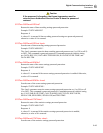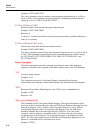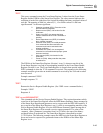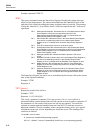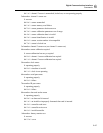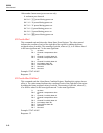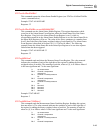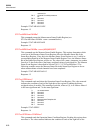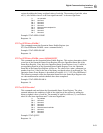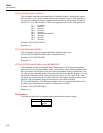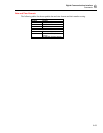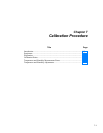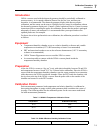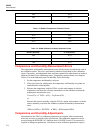
Digital Communications Interface
Commands 6
6-51
register by adding the binary-weighted values of each bit. The meaning of each bit, when
set (1), is as follows where 0 is the least significant and 7 is the most significant:
0: no operation
Bit 0 Not used.
Bit 1 Not used.
Bit 2 Not used.
Bit 3 Not used.
Bit 4 Measurement complete bit.
Bit 5 Not used.
Bit 6 Not used.
Bit 7 Not used.
Example: STAT:OPER:COND?
Response: 16
STATus:OPERation:ENABle?
This command returns the Operation Status Enable Register (see
STATus:OPERation:ENABle <num> command below).
Example: STAT:OPER:ENAB?
Response: 16
STATus:OPERation:ENABle <num>|MIN|MAX|DEF
This command sets the Operation Status Enable Register. This register determines which
event bits of the Operation Status Event Register affect the Operation Status Bit of the
Status Byte Register. If any bit in the Operation Status Event Register is set (1) while its
corresponding mask bit in the Operation Status Enable Register is set, the Operation
Status Bit in the Status Byte Register will be set. The value of the <num> parameter is a
number from 0 to 15 that is the sum of the binary-weighted values of each mask bit. The
Operation Status Event Register is described in Section 8.4.11.13, STATus:OPERation?.
The following example causes the Operation Status Bit in the Status Byte Register to be
set when measurements on both channels have been completed.
Example: STAT:OPER:ENAB 16
Response: 16
STATus:QUEStionable?
This command reads and clears the Questionable Status Event Register. The value
returned indicates the condition of each of the eight bits of the register by adding the
binary-weighted values of each bit. The meaning of each bit, when set (1), is as follows
where 0 is the least significant and 7 is the most significant:
0: no problem
Bit 0 Not used.
Bit 1 Not used.
Bit 2 Not used.
Bit 3 Not used.
Bit 4 Measurement Invalid bit.
Bit 5 Not used.
Bit 6 Not used.
Bit 7 Not used.
Example: STAT:QUES?
Response: 16



